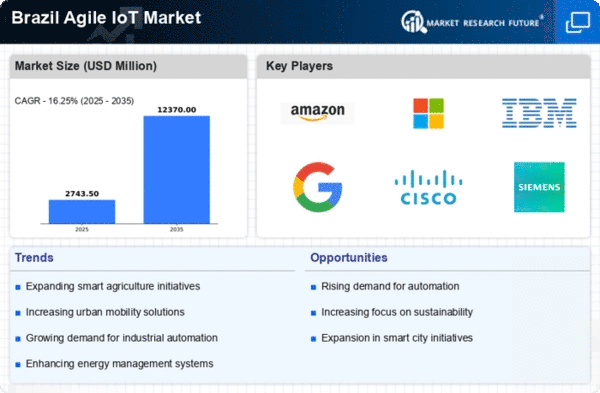Integration of AI and Machine Learning
The integration of artificial intelligence (AI) and machine learning (ML) technologies into the agile iot market is transforming how businesses operate in Brazil. These technologies enable devices to learn from data patterns, leading to improved automation and predictive capabilities. For instance, in sectors like retail and energy management, AI-driven IoT solutions can optimize inventory levels and energy consumption, respectively. The Brazilian government has been promoting initiatives to foster AI development, which is expected to enhance the agile iot market's growth. With an estimated investment of $1 billion in AI research and development, the potential for innovation in IoT applications is substantial. This integration not only streamlines operations but also enhances customer experiences, making it a critical driver for the agile iot market.
Expansion of Connectivity Infrastructure
The expansion of connectivity infrastructure in Brazil is a crucial driver for the agile iot market. With the rollout of 5G technology and improvements in broadband access, more devices can connect seamlessly, enabling a broader range of IoT applications. This enhanced connectivity is particularly beneficial for sectors such as transportation and healthcare, where real-time data exchange is essential. The Brazilian government has set ambitious goals to increase internet penetration to 95% by 2025, which is likely to facilitate the growth of the agile iot market. As connectivity improves, businesses will be able to leverage IoT solutions more effectively, leading to increased adoption and innovation in the market.
Rising Demand for Real-Time Data Analytics
The agile iot market in Brazil is experiencing a notable surge in demand for real-time data analytics. Businesses across various sectors are increasingly recognizing the value of immediate insights derived from IoT devices. This trend is particularly evident in industries such as manufacturing and logistics, where operational efficiency is paramount. According to recent data, the Brazilian market for data analytics is projected to grow at a CAGR of 25% over the next five years. This growth is likely to drive investments in agile IoT solutions that facilitate rapid data processing and decision-making. As organizations seek to enhance their competitive edge, the agile iot market is poised to benefit from this heightened focus on analytics, enabling companies to respond swiftly to market changes and consumer needs.
Government Initiatives Supporting IoT Development
Government initiatives in Brazil are playing a pivotal role in fostering the agile iot market. Policies aimed at promoting digital transformation and smart technologies are being implemented to enhance the country's technological infrastructure. The Brazilian government has allocated approximately $500 million to support IoT research and development projects. This funding is likely to stimulate innovation and encourage collaboration between public and private sectors. Furthermore, regulatory frameworks are being established to ensure data security and privacy, which are essential for building trust in IoT solutions. As these initiatives gain traction, they are expected to create a conducive environment for the agile iot market to flourish, attracting both domestic and international investments.
Growing Focus on Sustainability and Energy Efficiency
Sustainability and energy efficiency are becoming increasingly important in Brazil, driving the agile iot market forward. Companies are seeking IoT solutions that not only enhance operational efficiency but also reduce their environmental impact. For example, smart energy management systems are being adopted to monitor and optimize energy usage in real-time. This trend aligns with Brazil's commitment to reducing greenhouse gas emissions by 37% by 2025. The agile iot market is likely to benefit from this focus on sustainability, as businesses invest in technologies that support eco-friendly practices. The potential for cost savings through energy efficiency further incentivizes organizations to adopt agile IoT solutions, making this a significant driver in the market.
















